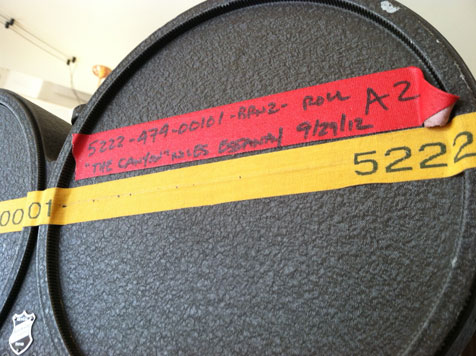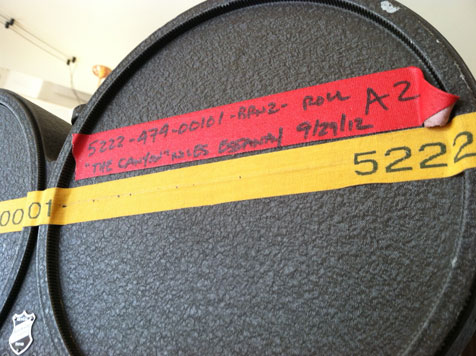
For the first time in probably four years, I actually worked with–and handled–film today. It hit me that this project may be my last chance ever to work with this medium, and that makes me a bit sad.
I've written before about how I'm helping shoot a “modern” silent film with a bunch of film geeks at the Niles Essanay Silent Film Museum. By the time I came on board they'd already rounded up a DP, and as I don't have the chops to hand crank at a perfect 16fps (silent movie film speed–two hand cranks per second) I volunteered my services as camera assistant. I haven't worked professionally as a camera assistant in twenty years, but for this one time I decided to revisit my career's roots for a good cause.
Boy, am I glad I did.
I don't know what kind of training modern camera people are getting. When I started out as a second camera assistant in the late 1980s, I fell in with a few old union hands who didn't let me get away with anything. I was a pretty miserable assistant when I started out but I was desperate to learn and become really, really good at my job, so I worked hard and absorbed every bit of information thrown at me. And there was a LOT of it. Hollywood is a very difficult market to thrive in, and to do so one has to become very good at working quickly, efficiently, and as error free as possible. Old union hands were the best to learn from because they'd seen it all and survived it all, and most of them didn't mind sharing their knowledge in the hope that the next generation could be as good as they were.
I became a very good camera assistant. I think I was average at pulling focus–maybe above average, as that's what a couple of DPs told me, although I never really believed them–but organizationally I had everything down. I knew where every piece of gear was at any given time. I knew what state the camera was in at any given time: focus, aperture, shutter, tachometer (F.A.S.T.), the four things to check before rolling the camera, became a part of my subconscious. I was constantly scanning the set and trying to anticipate the next shot, trying to reload the camera without anyone noticing, and just generally trying to do a really tough job in such a way that nobody noticed what I was doing. (You know someone is a good assistant if they don't draw any attention, because there are no small errors in the camera department–and errors draw a lot of attention.)
I've used those skills every day since. I shot film early on as second unit DP on a couple of features and some commercials, but I moved away from Los Angeles after a half dozen years in the industry as I just couldn't stand it anymore. I was tired of being treated so badly as a crew person, and I knew I'd miss film but I also knew that I couldn't stay there and thrive. I moved back to my native Northern California and learned video, because that's the work there was.
That move served me well, as film is now nearly gone and I'm a rare hybrid DP who understands both worlds. Most of all, I can apply the discipline that I acquired in the film world to my HD work. I occasionally do small jobs with a small camera and no assistant, and my organizational skills kick right in again. It's like the assistant part of my brain is dormant until I need it, and then it comes back as if it never left.
Today I enjoyed threading a 90-year-old silent film camera with black and white film stock. I held the film in my hands, guided it through the right channels and onto the right sprockets, and saw film running smoothly and reliably through a camera that's twice as old as I am. That was amazing.
I realized that, to some extent, I missed assisting on film shoots. I don't want to go back to being a professional camera assistant–I'm too good a DP and I enjoy that part of my work too much to go back to being primarily a technician–but being a technician for a day and touching film again was pretty magical. It was also fun learning a “new” camera of a type I'd never worked with before: a Bell & Howell 2709 with a parallax viewfinder. Yup, the viewfinder sits on the side of the camera and has to be lined up for every setup to make sure the DP sees roughly what the lens sees, because there's no way to see through the lens during the shot! Everything about this camera demanded discipline because there's no immediate feedback to know that something is wrong. You find out when everyone else finds out, when the dailies come back from the lab. That's when you–and EVERYONE else–knows whether you screwed something up. Camera assisting is a job where, if everything goes perfectly, nobody notices you at all.
Black and white dailies are now weeklies, because the two labs in the U.S. who process the film wait until they have enough of it to make a processing run worthwhile. There's no going back tomorrow and reshooting. If it's not there now it's not going to be there for a long, long time–if ever.
One of the film stocks we're using, Plus-X, isn't even made anymore. The production bought their supply from what Kodak has left in storage. When it's gone, it's gone.
I've long told both clients and students that film is easier to shoot than HD. It really is: once you know how the stock performs it will do the same thing every single time, no matter what camera you run it through. It's almost impossible to know exactly what the film will look like when it comes back from the lab so there are always surprises–and as one gets better at their job as DP, the surprises become exclusively positive. Film stock sees the world differently, and that is generally what people want when they go to a movie: they don't want to see reality, they want to see an interpretation of reality. Film does that really, really well. It's not WYSIWYG, but that's part of the fun. Dailies almost always looked WAY better than you expected the footage to look when you shot it. It was magical.
It's also the reason that we in the film industry have been able to make a reasonable living for so long. When only one person on the set really knows how the film is going to look, people tend to listen to that person and pay them a reasonable wage. It's one thing to work in HD with a really talented director and collaborate in real time, but it's quite another when there is no clear leader on the set and six people with different levels of power gather around the monitor and start offering conflicting opinions about the image. Old school filmmaking might have been a benign dictatorship in which the director is in control but the DP was the only one who really knew what the day's work would look like (and if it doesn't look right they probably won't be back!), but dictatorships can be very efficient things. Film production is organized militaristically anyway, as it's impossible to get anything of complexity done without a chain of command and knowing who is in charge, but when those who are meant to lead end up following because everyone can see the image and comment on it before it's even been recorded we lose something a bit like artistry.
I love HD. I thrive on HD. I love its complexities and possibilities. I love that there are so many different flavors and sizes of cameras. What I don't like is that everyone else gets a say over which one I have to use on a project. In the old days the DP usually chose the type of camera package–Arri, Panavision, Moviecam, etc.–and the film stocks, and had a say in the lab used to process and print everything. There were exceptions to this rule (Disney famously dictates that its film productions can only use Kodak stocks, and even specifies which stocks!) but generally it held. Now I'm often hired after the camera package is booked.
The bottom line is that film DPs had to be REALLY, REALLY GOOD to shoot film. These days… it feels as if the art and craft of cinematography is diminished because anyone can make an image with an affordable camera. The quality of the image gets lost in the affordability of recording the image. It's great that the barrier to entry is low enough that filmmakers who wouldn't have had a chance otherwise can strut their stuff, but it's unfortunate that their first films may suffer because they don't have the skills yet to capture their vision.
Is this a long rant on how film will always be better than HD and nothing will ever be the same? I hope not. I'm seasoned but I'm not a dinosaur. I just miss the days when being part of a film crew meant you had passed a certain bar professionally. Before I started working in film I was just another college grad hoping to make it big in the biz, but after being whipped into shape by the vagaries of film production I was a changed person, and changed for the better.
Today, when I threaded a 90-year-old camera with no motor, no reflex finder and a dozen things that had to be checked before each and every take so as not to screw them up and ruin everyone's hard work, I realized that I don't know how the next generation of filmmakers is going to get that boot camp experience. Where today can someone learn the incredibly beneficial combination of technical skill, precision and paranoia that make those who working in film some of the most amazing craftspeople ever? I just don't know.
I don't know anyone who's been through boot camp who came out the other side and said, “Well, that didn't help, I'm still the same person.” It feels like camera crew boot camp is dying off to affordable cameras and the demise of film, and until I know what its replacement will be I'll be a bit sad for those coming up behind me. I have no doubt that there will be great artists and craftspeople in the HD-only world to come, but I can't help but think that there may be fewer initially simply because they don't know what it's like to fight to become a really excellent craftsperson.
When you can't see the image, but you want to make it spectacular, you tend to become very focused on learning everything you can to make sure it's spectacular–and then you practice a lot. When the HD image is right there in front of you, live, and it looks pretty good… how much harder do you fight to make it better?
There's nothing like being on a film camera crew–DP, operator, assistant, loader–and knowing that everything you've shot today is going to be amazing when you see it tomorrow, because you're all good enough at your jobs to KNOW that everything's on the film exactly the way it should be (perfect exposure, perfect framing, perfect focus, etc.) without being able to see a live image. That's pretty cool. I'm going to miss it. I wish everyone could learn what that's like. It's a confidence builder like no other.
Art Adams | Director of Photography | 09/29/2012 | www.artadamsdp.com


